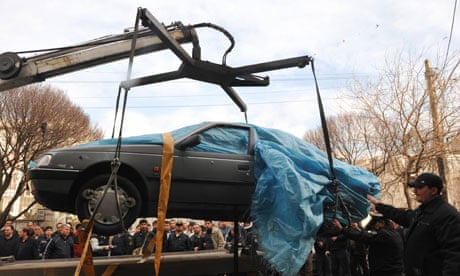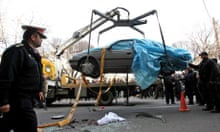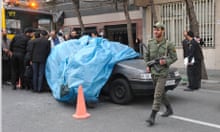Mostafa Ahmadi-Roshan was not the first Iranian nuclear scientist to be killed like this. In November 2010, not very far from the scene of today's assassination there were two identical attacks, in which a motorcycle drew up alongside the victim's car while it was in traffic and the riders stuck a magnetic bomb on the door. The bombs detonated as the assassins rode off.
One of those bombs killed Majid Shahriari, a member of the nuclear engineering faculty at Shahid Beheshti University in Tehran who was working on research projects with the Atomic Energy Organization of Iran (AEOI). The other slightly wounded Fereydoun Abbasi-Davani, the subject of UN sanctions and widely suspected in the West of involvement in nuclear weapon design.
In a reflection of his importance in the Iranian programme, Abbasi-Davani was made the head of the AEOI a few months later. Both he and Shahriari were big fish, like the first victim of the assassination campaign, a senior physicist, Masoud Ali Mohammadi, killed in January 2010 when a bomb on a parked motorcycle exploded as he walked to his car.
Ahmadi-Roshan, who was killed in today's blast, is reported to have held the position of deputy director at the uranium enrichment plant in Natanz, one of the most controversial parts of the programme. Iran is the subject of a string of UN Security Council resolutions and four sets of sanctions calling for it to suspend enrichment.
Not all the victims have been so senior. In July last year, gunmen on motorbikes shot dead July 2011, Darioush Rezaeinejad, an electronics student who was according to some accounts working on high-voltage switches, a component of nuclear weapons among other things.
The killers are clearly using loose criteria in choosing their victims. Any connection to any part of the nuclear programme seems to be enough to be selected as a target of opportunity.
Iranian officials have been quick to blame Israel, and the Israelis have not been going out of their way to avoid suspicion. On Tuesday, the head of the Israeli Defence Force, Lieutenant General Benny Gantz was quoted as telling a parliamentary panel that 2012 would be a "critical year" for Iran in which it would be subject to "unnatural" events.
The Israeli military establishment has a motive to claim successes in the covert war on Iran, because they are under political pressure to start an overt one. The generals, however, know that Israeli air strikes would unleash a war without accomplishing their goal of destroying the Iranian nuclear programme.
A covert war, based on assassinations and sabotage, may appear a better alternative. Individual killings may not seriously hinder a large, wide-ranging programme, but they would certainly deter young Iranians from taking that line of work.
But such a campaign is not without huge risks for the region. The regime in Iran has clearly tried to hold its nerve, avoiding overt reprisals that might in turn provoke a military response. But elements of the establishment do seem to be lashing out in frustration.
Last October's bomb plot against the Saudi ambassador and Israeli diplomats in Washington, alleged to be the work of the Iranian Revolutionary Guard, was both amateurish and extremely reckless. If Americans had been killed in the Georgetown restaurant that was supposedly the target, the Obama administration would have been obliged to respond militarily.
Likewise, the storming of the British embassy, on the anniversary of Shahriari's assassination, appeared to have gone much further than the leadership had intended, and significantly deepened Tehran's isolation.
"The old guys at the top are losing control of the situation," a senior western diplomat observed, the day before this latest killing. The fragmentation of the regime will have unpredictable, and possibly very violent outcomes. The pressure of sanctions is building. There is a lot of military hardware in the Gulf right now, some of belonging to the regularly Iranian navy and some to the Revolutionary Guards, who have their own agenda. Whoever is killing Iran's scientists is clearly willing to risk catastrophic consequences that could engulf the region.





Comments (…)
Sign in or create your Guardian account to join the discussion